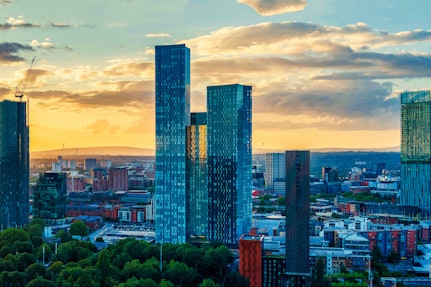Delivering inclusive growth through good employment
IGN partner Metro Dynamics share their work with Belfast City Council on the Belfast Business Promise

Good jobs are vital to delivering inclusive growth – that is enabling as many people as possible to contribute to and benefit from growth. This means moving away from an economic model where any job is seen as a success. It’s about the quality of jobs. Are people paid fairly? What about their terms? Do they have opportunities to train and progress? Is it a healthy workplace? Do they have a voice at work?
Employment charters have been established in many places – from Plymouth to Greater Manchester (where we're signed up as a Member of the Good Employment Charter) – as a tool for influencing good employment. These voluntary membership schemes are a way of mayors and leaders using their soft and convening power and working in partnership with businesses to encourage good employment practices.
Belfast City Council launched the Belfast Business Promise last year. This new free accreditation scheme is for employers who are committed to working together to make Belfast a better city and improve how they do business. We supported the Council and partners to develop their inclusive growth city charter, following several years of work on inclusive growth strategy and delivery in the city.
Belfast’s inclusive growth journey
Inclusive growth is at the heart of the Belfast Agenda, the city’s first community plan, published in 2017. Our work with the Council started with defining what inclusive growth meant for the city, an extensive process that involved looking at the data to understand the inclusive growth challenges, visiting different neighbourhoods across the city, and speaking to Council officers and party leaders.
We used the insights from the evidence and conversations to create a shared definition of inclusive growth that everyone signed up to. To make this tangible, we developed a set of inclusive growth cohorts, the groups that, where possible, inclusive growth interventions should target most (note, these have been further developed through work by Queen’s University). These inputs formed the bedrock of Belfast’s first Inclusive Growth Strategy, ensuring that the success of the city reaches every citizen.
Developing a charter for Belfast
One of the key commitments in the strategy was to establish an employer charter to encourage organisations across Belfast to ensure their business practices as employers, procurers or in the delivery of their services are channelled in the direction of more inclusive growth across Belfast. A key aspect of this involved improving access to high quality work – 1 in 4 residents in Northern Ireland are economically inactive, and for those in work, around 11% are ‘low-paid’, which is the joint highest of all UK regions.
In January 2020, we ran an in-person half day workshop with businesses and stakeholders to launch the strategy and build interest and momentum around a city charter. This kickstarted the work that took place over the next couple of years on developing a charter from design through to implementation. We worked with the Council and businesses to make the case for a charter, define what the commitments would be, and build a wider wrap around business support network and service to help employers engage, accredit and progress.
We began by reviewing good practice to understand the approaches taken by other places and the lessons learned. The charter design and pledges were codeveloped with employers and stakeholders through extensive engagement, co-led by us and officers. We also supported officers to develop the delivery model, accreditation process, and monitoring and evaluation framework.
The Belfast Business Promise
The Belfast Business Promise is distinctive in that its eight pledges go beyond the statutory responsibilities of businesses and organisations as employers to consider their wider role in the city and its communities. This includes adopting good business practices, such as providing good jobs, supporting local businesses through procurement, working in partnership with communities through meaningful engagement, tackling climate change and protecting the environment. It sets aspirations for excellence but has been designed to be flexible enough to make sure all employers can take part, regardless of size and sector.


Belfast Business Promise Partners
The Council has invested in the Belfast Business Promise as a core programme and there are now three full-time officers leading its implementation alongside a wider partnership of specialist organisations.
It is a success story and has gained traction within the business community with 39 organisations currently on their journey to becoming accredited, including Babcock, Belfast Harbour, BT, Queen’s University Belfast, Ulster University and organisations from the voluntary, community and social enterprise sector across Belfast.
The initiative has been recognised nationally and was showcased at the Good Employment Conference in Manchester last September, hosted by the Inclusive Growth Network, Manchester Metropolitan University and ACAS.
What next?
Employment charters are a useful tool for places to support the delivery of inclusive growth through good employment. In Belfast, the Council is pioneering a new partnership-based approach to maximise the wider social and environmental impact of businesses. There are opportunities to build on this and further leverage the transformational role of businesses in delivering a more inclusive city economy.
For more on good employment and inclusive growth
If you’re interested in hearing about more about Metro Dynamics’ work on inclusive growth and good employment, please get in touch.
Read more on the Inclusive Growth Network Resource Hub for practical resources and good practice.
If you are a business in Belfast, you can find out more about the Belfast Business Promise by registering your interest.
IGN Insights
Browse other IGN insights to find what inclusive growth looks like in practice and how it is benefitting people and places across the UK













